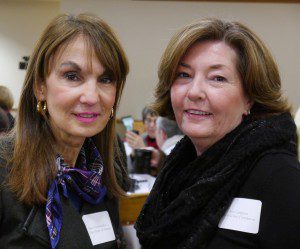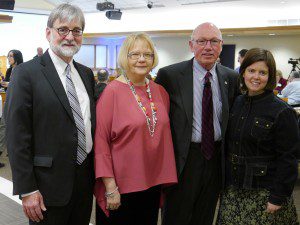
Thea Katsounakis, Vice President at U.S. Trust Bank of America, and Amy Carignan, of the Westfield State Foundation. (Photo submitted)
LONGMEADOW– “Every act of philanthropy is the act of a human being,” Dr. Eugene Tempel reminded guests at Bay Path Friday as part of the College’s Hot Topics lecture series. “A lot of data begins to mask that.”
Bold Thoughts in the New America is the subheading of Bay Path College’s Hot Topics Lecture Series.These new ideas were presented byTempel, Indiana University’s Lilly Family School of Philanthropy founding dean and president emeritus. The focus of his conversation was how the culture and philosophy of philanthropic giving is at a crucial juncture of transformation.
Bay Path Provost, Dr. Melissa Morriss-Olson, introduced Tempel as one of the brightest minds in philanthropy. Among his many awards and honors, he was recognized by The NonProfit Times as 2013’s “Influencer of the Year,” for his founding of the first-ever academic program dedicated to the study and teaching of philanthropy.
Thanking him for his development in the field, Morriss-Olson added that Bay Path’s Nonprofit Management and Philanthropy and Strategic Fundraising and Philanthropy masters programs, begun in 2006, owe a debt to his vision. “Our graduates have gone on to incredible things,” she said. “They have a desire to do well by doing right. They have chosen to work in a field where they make a difference.”
Bay Path’s Dr. Sarah Nathan, in her introduction of her former mentor, said that among Tempel’s many honors and awards, he is a philanthropist in his own right.
“He lives the life of a philanthropist,” she said. “And gives people like you and me his time and wisdom.”

L-R: Jeff Greim, Bay Path’s program director of the Masters in Nonprofit Management and Philanthropy, and also the director of the Masters in Strategic Fundraising and Philanthropy; Melissa Morriss-Olson, Bay Path College Provost; Eugene Tempel; Sarah Nathan, Bay Path assistant professor. (Photo submitted)
In Tempel’s philosophical approach to this field, he said that it is important to understand the role that philanthropy has in society.
“Empowering us to work in this field, it helps reduce human suffering and make people whole,” he said. “It is also about helping people reach full potential. To help every human be the person they can be.”
“Within these common causes, this is where we find community,” he said. “It is how human beings can feel whole.”
Not only that, but he elevated this philosophy to the basic tenets of civilization.
“This is how we participate in democracy,” he said. “We know twice as many numbers of people volunteer and give every year as they vote. Even in the best elections. This is how we are fulfilling our democracy. We can make our society better by private action for the public good.”
Traditionally one of the largest beneficiaries of charitable giving, religion is now experiencing a plateau in contributions. Education and foundations are the new growth sectors for philanthropy. Only among the general population is religion still significant for their giving.
“Foundations are the new religion (for those with higher net worth),” Tempel said.
Men and women approach philanthropy differently, he said. And as no surprise to a room with many bold Bay Pathers, “it turns out that women are more philanthropic than men.”
“Households with women are more likely to give, and more likely to give more in every income group,” he said. Yet among young boys and girls between the ages of eight and 19 from a study, “they are likely to be equally generous.”
Of particular interest to experts in philanthropy will be the decreasing role held by Baby Boomers as they age, and the rise of Millenials and Generation X—populations whose approach to philanthropy differs significantly from previous generations. Most researchers show that they undertake philanthropy “in their own way,” Tempel said. The challenge will be to harness that individualistic perspective.
Tempel ended his presentation on an uplifting note. Sarah Konrath, from the University of Michigan, has compiled with neuroscientists a massive research panel which shows that giving is good for you.
“When people think altruistically, they experience electrical activity in the pleasure centers of the brain,” Tempel said.
It was a great message to end on for a room filled with nonprofit professionals,translating philanthropic giving into increased positive health outcomes, including beneficial health for older adults. Giving back really means paying it forward—for everyone involved.

